Therapeutic baking classes offer a unique way to manage stress and improve your mental well-being. You'll engage in mindful activities, stimulate your senses, and boost self-esteem through creating tangible treats. These classes provide a supportive environment for sharing experiences and skills while enhancing teamwork. You'll learn mindful baking techniques, discover anxiety-friendly tools, and explore recipes designed for relaxation. Creating a soothing baking environment and incorporating baking into your daily routine can greatly reduce stress. Whether you're a novice or experienced baker, these classes can help you harness the therapeutic power of baking. Uncover the ingredients for a calmer, more balanced life through the art of baking.
Understanding Baking as Stress Relief
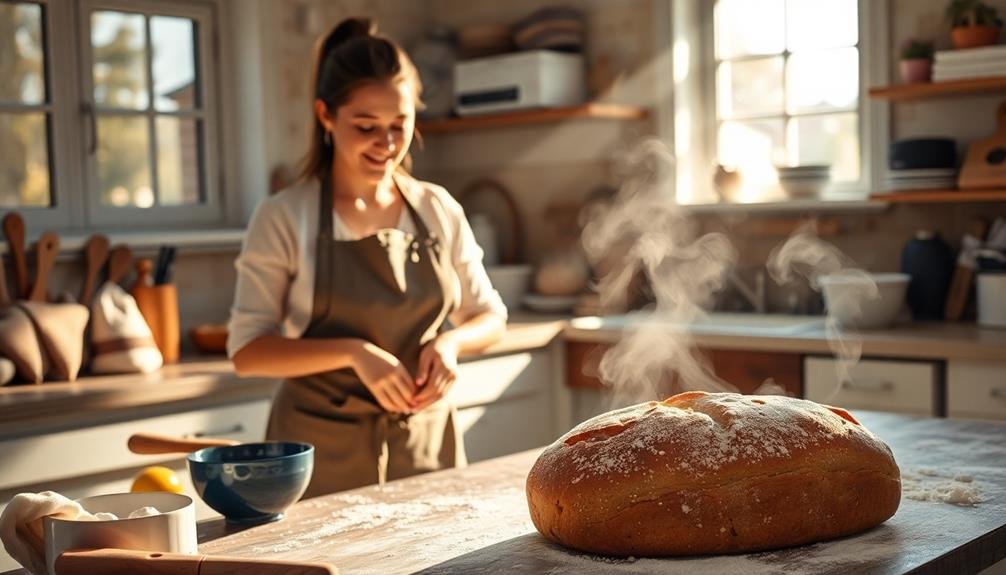
In recent years, baking has emerged as a popular form of stress relief. You've probably noticed the trend of people turning to their kitchens for comfort during challenging times. But why is baking so effective at reducing stress?
When you bake, you're engaging in a mindful activity that requires focus and attention to detail. This concentration can help quiet your racing thoughts and provide a much-needed mental break. The repetitive actions of measuring, mixing, and kneading can be meditative, allowing you to enter a state of flow.
Baking also stimulates your senses. The aroma of fresh bread or cookies can trigger positive emotions and memories, while the tactile experience of working with dough can be grounding.
You'll find that the act of creating something tangible can boost your self-esteem and provide a sense of accomplishment.
Moreover, baking often involves sharing your creations with others, fostering social connections and generating feelings of generosity and kindness.
Finding Local Therapeutic Baking Classes
Now that you're aware of baking's therapeutic benefits, you might be wondering how to get started with therapeutic baking classes in your area.
Begin your search by checking local community centers, culinary schools, and recreational facilities. Many of these institutions offer specialized baking courses that focus on mindfulness and stress relief.
Don't overlook your local bakeries and cafes. Some may host workshops or partner with mental health professionals to offer therapeutic baking sessions.
Online platforms like Meetup or Eventbrite can also be valuable resources for finding nearby classes or groups dedicated to mindful baking.
If you can't find specific therapeutic baking classes, consider reaching out to local mental health organizations or wellness centers. They might offer recommendations or even be interested in starting a program if there's enough interest.
Social media can be a powerful tool in your search. Join local baking groups on Facebook or follow hashtags related to therapeutic baking on Instagram. You'll often find announcements for upcoming classes or workshops.
Lastly, don't hesitate to ask your therapist or counselor if they know of any therapeutic baking programs in your area. They might've valuable connections or resources to share.
Benefits of Group Baking Sessions

Group baking sessions offer a unique blend of therapeutic benefits that extend beyond individual practice. You'll find that baking with others creates a supportive environment where you can share experiences, learn new skills, and build connections. As you work together, you'll develop a sense of camaraderie and belonging, which can be particularly beneficial if you're dealing with stress, anxiety, or isolation.
In these sessions, you'll also have the opportunity to improve your communication and teamwork skills. You'll learn to delegate tasks, coordinate efforts, and provide constructive feedback. This collaborative approach can boost your confidence and self-esteem as you contribute to a shared goal.
| Benefits | Individual | Group |
|---|---|---|
| Skill Development | Limited to personal experience | Enhanced through shared knowledge |
| Social Interaction | Minimal | High, fostering connections |
| Stress Relief | Self-focused | Amplified by collective support |
Group baking sessions additionally provide a structured environment that can help you stay focused and motivated. You'll benefit from the collective energy and enthusiasm of the group, which can inspire you to try new techniques and recipes. Furthermore, the shared sense of accomplishment when you complete a baking project together can be incredibly rewarding and mood-boosting.
Essential Tools for Anxiety-Friendly Baking
Setting up your baking space with the right tools can greatly reduce anxiety and make your therapeutic baking sessions more enjoyable. Start with a reliable kitchen scale for accurate measurements, which helps eliminate guesswork and promotes confidence.
Invest in easy-to-read measuring cups and spoons to guarantee precise ingredient portions. A stand mixer can be a game-changer, allowing you to multitask and reduce physical strain. If you prefer a more hands-on approach, opt for a high-quality hand mixer.
Non-stick silicone baking mats and parchment paper prevent frustrating stuck-on messes and simplify cleanup. Choose sturdy, oven-safe mixing bowls in various sizes for efficient ingredient preparation.
Silicone spatulas and wooden spoons are essential for gentle mixing and scraping. A set of cooling racks will help your baked goods cool evenly and prevent sogginess.
Don't forget about organization tools like labeled storage containers and a recipe binder to keep your baking area tidy and stress-free.
Mindful Baking Techniques and Practices
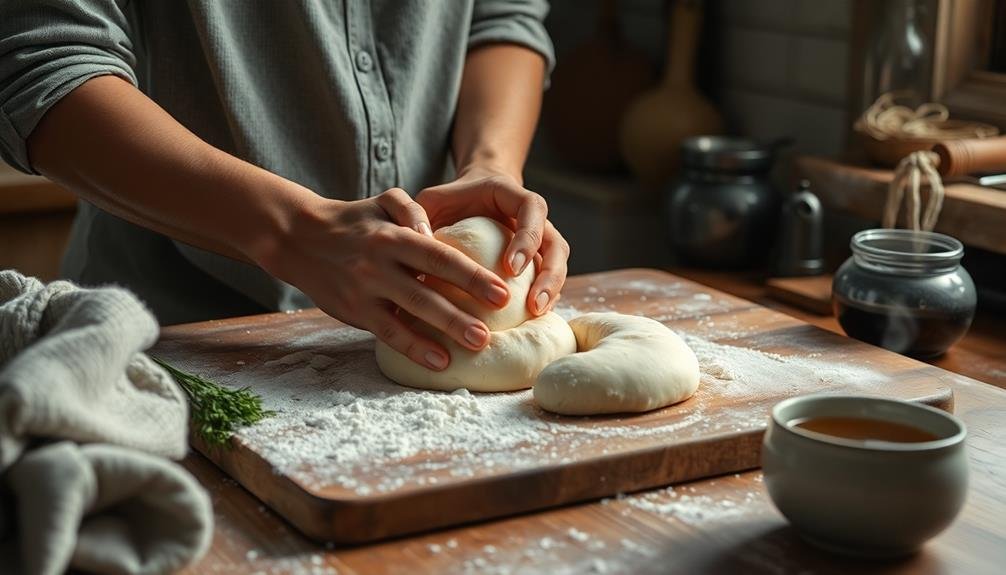
As you engage in mindful baking, remember to breathe deeply through each step of the process.
Pay attention to the sensory experiences: the texture of dough, the aroma of spices, and the sound of a whisk against a bowl.
Embrace any imperfections in your baking, recognizing that these "flaws" are part of your unique creation and the therapeutic journey.
Breathe Through the Process
Mindfulness transforms baking from a routine task into a therapeutic experience. As you engage in the baking process, focus on your breath to anchor yourself in the present moment. This simple practice can help reduce stress and anxiety while enhancing your enjoyment of the activity.
When you're working with dough, synchronize your breathing with your kneading motions. Inhale as you push the dough away, and exhale as you fold it back towards you. This rhythmic breathing can create a meditative state, allowing you to fully immerse yourself in the sensory experience of baking.
Here's a guide to mindful breathing techniques for different baking tasks:
| Baking Task | Breathing Technique | Benefits |
|---|---|---|
| Mixing | Slow, deep breaths | Calms nerves |
| Kneading | Breath with motion | Enhances focus |
| Waiting | Counted breaths | Builds patience |
| Decorating | Steady, even breaths | Improves precision |
| Tasting | Mindful savoring | Heightens enjoyment |
Focus on Sensory Experiences
Engage your senses fully when baking to transform it into a mindful, therapeutic practice. As you mix ingredients, feel the textures beneath your fingers. Notice the coolness of flour, the grittiness of sugar, and the smoothness of butter.
Listen to the sounds of your kitchen: the whir of the mixer, the crackle of parchment paper, and the gentle tapping of a spoon against a bowl. Inhale deeply to appreciate the aromas that fill the air. From the warm, comforting scent of vanilla to the sharp tang of lemon zest, let each fragrance transport you to a place of calm.
As your creation bakes, observe how the smells evolve and intensify. To fully immerse yourself in the sensory experience, try these techniques:
- Close your eyes while kneading dough, focusing on the tactile sensations
- Taste small amounts of ingredients to explore their individual flavors
- Watch the transformation of your batter or dough as it bakes through the oven window
Embrace Imperfections in Baking
Perfectionism can hinder the therapeutic benefits of baking. Instead, embrace imperfections as part of the process. When you're in a therapeutic baking class, focus on the experience rather than achieving flawless results. Accept that your creations may not look like they've stepped out of a glossy cookbook, and that's okay.
Allow yourself to make mistakes and learn from them. If your dough doesn't rise perfectly or your frosting isn't smooth, use it as an opportunity to practice self-compassion. Remember, the goal is to reduce stress, not increase it. Embrace the uniqueness of your baked goods and celebrate the effort you've put into making them.
Try techniques that encourage imperfection, like rustic bread-making or free-form pie crusts. These methods allow for more creativity and less pressure to achieve perfection.
As you bake, notice any perfectionist thoughts and gently redirect your focus to the sensory experiences and the joy of creation.
Recipes for Calm and Relaxation
The art of baking can be a soothing balm for the soul, and certain recipes are particularly effective at promoting calm and relaxation. When you're feeling stressed, try your hand at baking lavender shortbread cookies. The gentle aroma of lavender will fill your kitchen, creating a tranquil atmosphere as you mix, shape, and bake these delicate treats.
Another calming option is chamomile tea cake, which combines the soothing properties of chamomile with the comforting act of baking.
For a more meditative experience, consider making bread from scratch. The process of kneading dough can be incredibly therapeutic, allowing you to focus on the present moment and release tension. As you work the dough, visualize:
- The stress leaving your body with each push and fold
- Your worries dissolving into the flour on your hands
- A sense of accomplishment rising like the dough itself
Don't forget about the power of comfort foods. Baking a warm apple pie or gooey cinnamon rolls can evoke feelings of nostalgia and contentment. As you measure, mix, and bake, you'll find your mind settling into a peaceful rhythm, leaving your worries behind.
Creating a Soothing Baking Environment
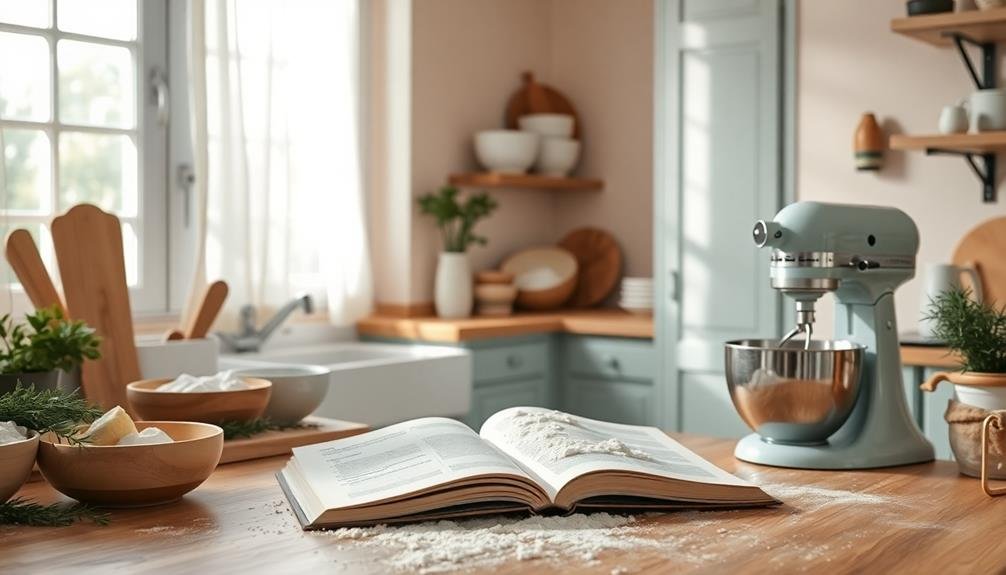
Setting up your kitchen for therapeutic baking is essential to maximizing the calming effects of this activity. Start by decluttering your workspace, guaranteeing you have ample room to move and breathe. Choose soothing colors for your kitchen accessories, like soft blues or greens, to create a tranquil atmosphere.
Invest in quality, comfortable tools that feel good in your hands. Opt for wooden utensils and silicon baking mats for a more tactile experience. Ascertain proper lighting with warm, adjustable options to reduce eye strain and promote relaxation.
Incorporate nature by adding a small herb garden or potted plants to your kitchen. The greenery will purify the air and provide fresh ingredients for your bakes. Consider using essential oils in a diffuser to fill the space with calming scents like lavender or vanilla.
Create a dedicated baking playlist with soothing music or nature sounds to enhance the therapeutic experience. Keep the temperature comfortable, and use an apron or comfortable clothing to feel at ease while you bake.
Incorporating Baking Into Daily Routine
Integrating therapeutic baking into your daily routine can greatly enhance your overall well-being. Start by setting aside a specific time each day for baking, even if it's just 15 minutes. This consistency will help you build a habit and guarantee you're regularly engaging in this stress-relieving activity.
Choose simple recipes that don't require extensive preparation or cleanup for your daily baking sessions. Quick breads, muffins, or cookies are excellent options. Keep your pantry stocked with essential ingredients so you're always ready to bake.
To create a calming baking ritual, try these steps:
- Put on your favorite cozy apron and play soothing music
- Take three deep breaths before you begin, focusing on the task ahead
- Mindfully measure and mix ingredients, savoring the textures and aromas
Frequently Asked Questions
Are There Online Therapeutic Baking Classes Available?
Yes, you'll find many online therapeutic baking classes available. They offer stress relief and mindfulness through baking. You can join live sessions or follow pre-recorded tutorials, learning techniques to calm your mind while creating delicious treats.
Can Children Participate in Therapeutic Baking Sessions?
Yes, children can participate in therapeutic baking sessions. You'll find many programs designed specifically for kids, helping them develop motor skills, learn patience, and boost self-esteem. Always guarantee adult supervision for safety during these activities.
How Long Does a Typical Therapeutic Baking Class Last?
You'll typically spend 2-3 hours in a therapeutic baking class. It's long enough to complete a recipe, learn techniques, and enjoy the process. Some classes may be shorter or longer, depending on the specific program's goals.
Are There Specialized Classes for Specific Mental Health Conditions?
You'll find specialized baking classes tailored to specific mental health conditions. They're designed to address anxiety, depression, PTSD, and more. You can choose a class that best fits your needs and therapeutic goals.
Do I Need Prior Baking Experience to Join a Therapeutic Baking Class?
You don't need prior baking experience to join a therapeutic baking class. These classes are designed for all skill levels, from beginners to experienced bakers. You'll learn techniques and recipes while enjoying the therapeutic benefits of baking.
In Summary
You've discovered a delicious path to stress relief through therapeutic baking. By joining classes, mastering mindful techniques, and creating a soothing baking environment, you're not just making treats—you're crafting moments of calm. Remember, it's not about perfection; it's about the process. So preheat your oven, dust off your apron, and let the aroma of freshly baked goods guide you to a more relaxed state of mind. Happy baking!

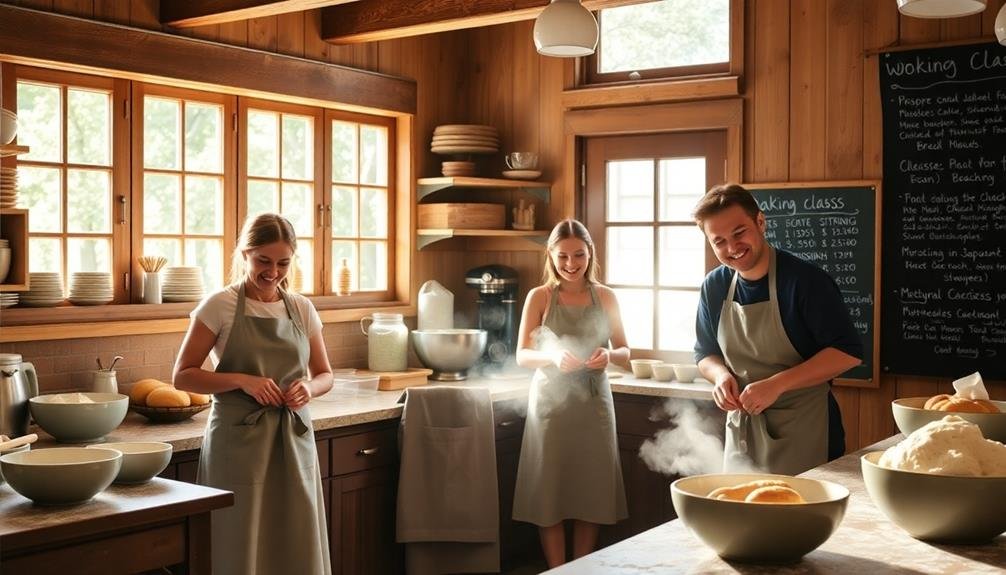
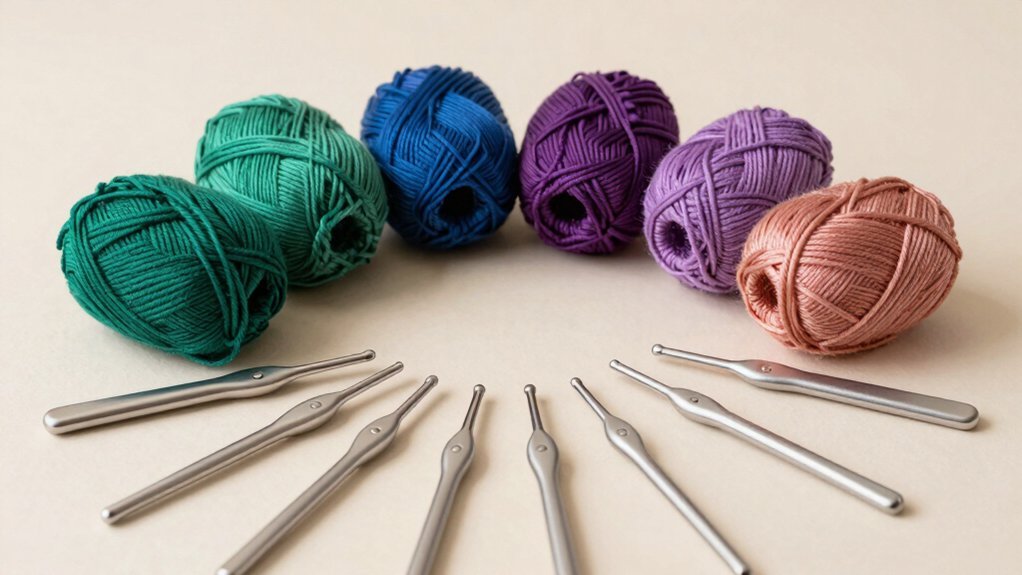

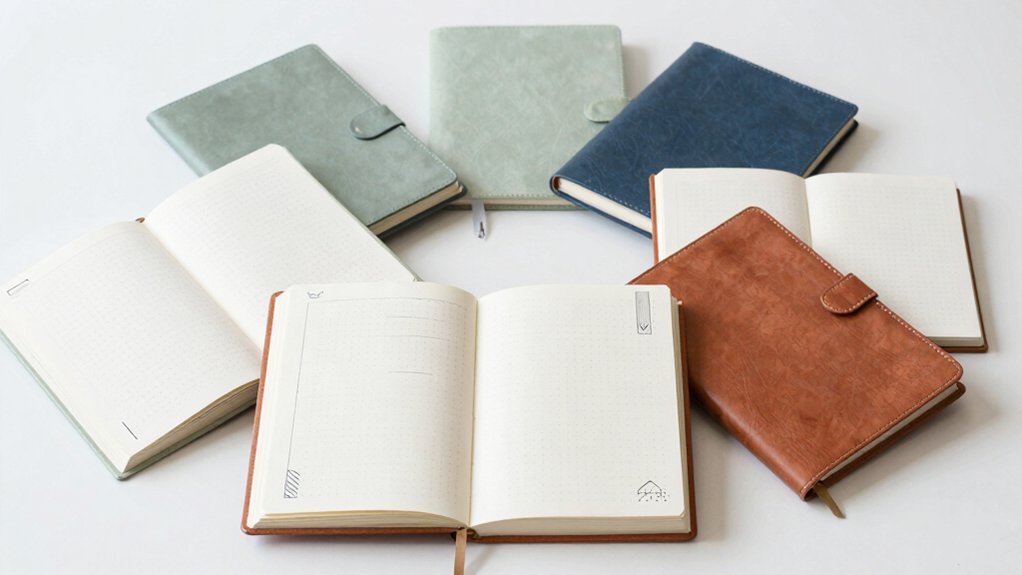
Leave a Reply